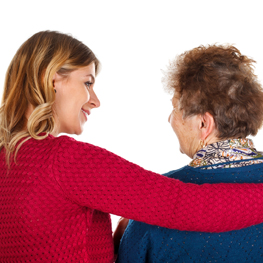
Honor the caregivers you know, whether they are a family member, friend, neighbor, or co-worker. By showing them your support, you are taking away a bit of their burden, sadness, guilt or pain, if only for a moment. Not sure how you can help? Check out these 12 suggestions.
1. Give them much needed time off. Offer to sit in their place while they attend their child’s soccer game or spouse’s work dinner. You can drive to routine doctor appointments, take their patient on a small outing, or simply be on call for the day in the caregiver’s place.
2. Make them a home-cooked meal. The caregiver often lets their own health go while taking care of their loved one. As you plan your own dinner, make a double batch to take over to the caregiver’s house. Deliver the meal ready to eat. If you are not a cook yourself, offer the family a restaurant gift certificate so they can enjoy family time alone.
3. Offer to do a task. Caregivers have their hands full with their patient and the immediate needs of their family. Everything else takes a back seat. Don’t offer a general “let me know what I can do to help.” Instead, if you specifically offer to shop, mow the lawn, walk the dog, or handle a carpool, they will most likely take you up on it.
4. Write a handwritten note of encouragement. During this stressful and often sad time in the caregiver’s life, they need to be reminded that they are doing their best. Your letter will most likely be read and reread when the caregiver has a quiet moment and needs an extra pick-me-up. They might also enjoy you sharing a memory of their loved one during better times.
5. Bring awareness. While the caregiver is busy taking care of their sick patient, their friends and supporters might like to donate time and money to their cause. Gather people for a Relay for Life, play Bunco for Breast Cancer Awareness, or sponsor a golf outing with the proceeds going to their cause. Check with the caregivers for local needs like chemo packages at the hospital.
6. Make a de-stress basket. Include favorites for the caregiver like wine, homemade baked goods, magazines, and a gift certificate to a spa or spa items they can use at home. Either present as one large gift or spread it out for a week by sending a little gift each day.
7. Bring the party to them. If the caregiver has to routinely cancel plans in order to stay home with their loved one, have the event at their house. The caregiver’s friends will clean before and after the party, bring the food and drink, and provide the entertainment. Even an hour-long party will brighten the caregiver’s day.
8. Offer your expertise. Most of the caregiver’s responsibilities will be new to them. If you are a nurse, offer to help administer medication. Estate planners or lawyers may also want to answer questions that come up. Friends that have served as caregivers in the past can be the best guides during this difficult process.
9. Be the shoulder to cry on. Sometimes the caregiver just needs to vent about their patient, the doctors, the time they’ve had to take off work, or the unfairness of it all. Often the caregiver wants someone to listen and sympathize, but not necessarily propose a solution. In other words, they just need a good friend.
10. Keep inviting. Long-term caregivers can feel like their friends have forgotten them after the initial first few months in their new position. The cards, care packages, and invitations quit coming. Extend the invites to parties as well as for a walk around their neighborhood with them. If they say no, don’t badger. Instead, offer a rain check and ask again next time. Eventually, they will take you up on it.
11. Keep the caregiver smiling. Send a funny card in the mail. Email a daily joke. Text a silly picture or a meme. Try to break the cycle of seriousness, if only for a moment. It shows the caregiver that you are still thinking about them.
12. Help to fill the gap. A longtime caregiver’s job often ends due to the death of their patient. When that happens, there will be a large hole in their life. Not only did their loved one pass away, but their identity as a caregiver and daily routine has come to an abrupt end. Offer your support to help them get back on their feet and find a new normal.
Pam is a freelance writer, and a daughter of a caregiver. She knows how much stress it puts on a family, and hopes that caregivers get the recognition they deserve.
Calgary’s Child Magazine © 2024 Calgary’s Child